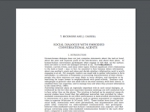
Chatbot listing, virtual agents, virtual assistants, chat bot directory, conversational agents, virtual human news, chatterbot list
NEWS: Chatbots.org survey on 3000 US and UK consumers shows it is time for chatbot integration in customer service!read more..
Social Dialogue with Embodied Conversational Agents
 This paper extends our previous work which demonstrated that social dialogue can have a significant impact on a user's trust of an ECA, by investigating whether these results hold in the absence of nonverbal cues. We present the results of a study designed to determine whether the psychological
This paper extends our previous work which demonstrated that social dialogue can have a significant impact on a user's trust of an ECA, by investigating whether these results hold in the absence of nonverbal cues. We present the results of a study designed to determine whether the psychological effects of social dialogue – namely to increase trust and associated positive evaluations - vary when the nonverbal cues provided by the embodied conversational agent are removed. In addition to varying medium (voice only vs. embodied) and dialogue style (social dialogue vs. task-only) we also assessed and examined effects due to the user's personality along the introversion/extroversion dimension, since extroversion is one indicator of a person's comfort level with faceto-face interaction.
New Comment
Only registered members are allowed to comment. or login
or login
